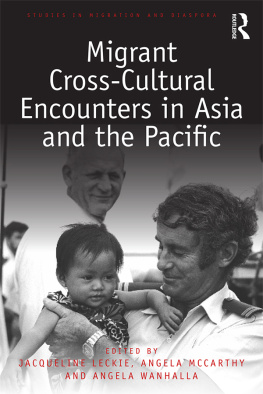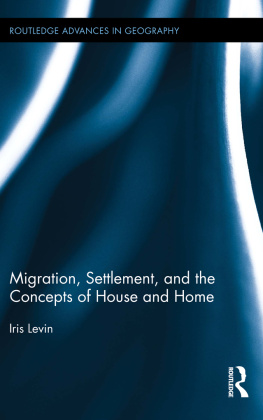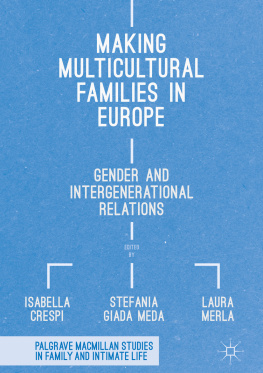
Convivial Cultures in Multicultural Cities
The large-scale migration brought about by the expansion of the EU over a decade ago led to migration from less ethnically diverse countries to multicultural and super-diverse societies. This book examines the complex encounters between Polish migrant women and local populations in Manchester and Barcelona, with attention to the ways in which difference is negotiated and managed through everyday practices of conviviality, which help to overcome hierarchies and create elements of sameness. Illustrating how cultural differences may become important resources for interaction that facilitates positive relationships, Convivial Cultures in Multicultural Cities draws on the narratives of Polish migrant women to shed new light on everyday social relations between migrant women and local populations, including settled ethnic minorities and other migrants. In doing so, it contributes to our understanding of the positional nature of racial identification and complicates our ideas of whiteness and privilege.
Alina Rzepnikowska is Lecturer in Sociology, the School of Social Sciences at the University of Manchester, UK.
Studies in Migration and Diaspora
Series Editor: Anne J. Kershen
Queen Mary University of London, UK
Studies in Migration and Diaspora is a series designed to showcase the interdisciplinary and multidisciplinary nature of research in this important field. Volumes in the series cover local, national and global issues and engage with both historical and contemporary events. The books will appeal to scholars, students and all those engaged in the study of migration and diaspora. Amongst the topics covered are minority ethnic relations, transnational movements and the cultural, social and political implications of moving from over there, to over here.
Wellbeing of Transnational Muslim Families
Marriage, Law and Gender
Edited by Marja Tiilikainen, Mulki Al-Sharmani and Sanna Mustasaari
Tracing Asylum Journeys
Transnational Mobility of non-European Refugees to Canada via Turkey
Ugur Yildiz
Convivial Cultures in Multicultural Cities
Polish Migrant Women in Manchester and Barcelona
Alina Rzepnikowska
Democracy, Diaspora, Territory
Europe and Cross-Border Politics
Olga Oleinikova and Jumana Bayeh
Migration, Education and Translation
Cross-Disciplinary Perspectives on Human Mobility and Cultural Encounters in Education Settings
Edited by Vivienne Anderson and Henry Johnson
For more information about this series, please visit: https://www.routledge.com/sociology/series/ASHSER1049
First published 2020
by Routledge
2 Park Square, Milton Park, Abingdon, Oxon OX14 4RN
and by Routledge
52 Vanderbilt Avenue, New York, NY 10017
Routledge is an imprint of the Taylor & Francis Group, an informa business
2020 Alina Rzepnikowska
The right of Alina Rzepnikowska to be identified as author of this work has been asserted by her in accordance with sections 77 and 78 of the Copyright, Designs and Patents Act 1988.
All rights reserved. No part of this book may be reprinted or reproduced or utilised in any form or by any electronic, mechanical, or other means, now known or hereafter invented, including photocopying and recording, or in any information storage or retrieval system, without permission in writing from the publishers.
Trademark notice: Product or corporate names may be trademarks or registered trademarks, and are used only for identification and explanation without intent to infringe.
British Library Cataloguing-in-Publication Data
A catalogue record for this book is available from the British Library
Library of Congress Cataloging-in-Publication Data
A catalog record for this book has been requested
ISBN: 978-0-8153-7792-4 (hbk)
ISBN: 978-1-351-23355-2 (ebk)
Typeset in Times New Roman
by Apex CoVantage, LLC
To all those who took part in my research
In 2004, ten new countries acceded to the European Union; with the exception of the islands of Cyprus and Malta, all were from Eastern and Central Europe. Whilst the majority of countries in the EU delayed free access to the newcomers, the United Kingdom, Ireland and Sweden permitted immediate freedom of entry. One of the main reasons for the British Governments decision was an assumption that only between five and thirteen thousand immigrants would arrive annually from the Accession (A8) countries. In reality the forecast proved totally inaccurate: at the time of the 2011 Decennial Census, 579,121 Polish nationals were recorded as living in England and Wales, an increase of 521,014 on the 2001 figure. It has been argued that the presence of such a large one-nation immigrant population and its (perceived) impact on Britains job market and national identity was a powerful influence behind the Brexit outcome of the 2016 referendum; and it is within this heightened anti-immigrant context that Alina Rzepnikowska explores the everyday interactive experiences of female Polish migrants in Manchester.
However, the author does not leave her examination of quotidian female migrant conviviality as a single spatial/national survey. She expands her work further and deeper by presenting a binary study, selecting Barcelona as a comparison. While the arrival of Polish migrants has not been of the same volume as in the UK, their number is growing and the authors investigation highlights another feature of migrant conviviality: the existence of diverse national cultures in one city. In Barcelona, which has been at the heart of the fight for Catalonian independence, one aspect of this diversity is the need for the migrant women to learn both Catalan and Spanish and acquaint themselves with the two cultures in order to interact at a local level with their Spanish counterparts. Having been provided with a dual locational study, the reader is able to compare and contrast the female migrant experience in two major cities and assess the ways in which politics, culture, economic activity, parenthood and racism influence successful conviviality at the grass roots.
This volume is the result of research which the author has undertaken with depth and compassion. It is enhanced by Rzepnikowskas positionality which, as someone of Polish nationality and tongue, has enabled her to interview her protagonists both in the public space and in the privacy of their own homes. Though rich in methodology and theory providing detailed background to the concept of medieval convivencia it is the empirical chapters which bring us face to face with the women who find themselves amongst strange cultures and societies. As the author emphasises, whilst some research has been carried out on migrants in the workplace, there has been a paucity of material which analyses the different aspects of female migrant and indigene interaction in a work environment. There is not one overall image. Whilst in some instances there is humour, collegiality and the creation of friendships that extend beyond work, the author also provides examples of exploitation, discrimination and racism. These negative patterns of behaviour call on the migrant to devise strategies in order to overcome the disagreeable nature of the work experience.







